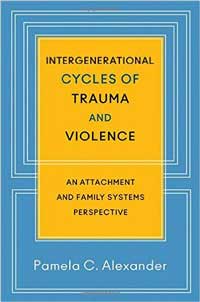 223 pages
223 pages8 CE credits
Course Enrollment
$200.00
Add to Cart
All exams are taken online. The exam for this course will be available in "My Courses" immediately upon enrollment. Note the book is not included.
The book is available for purchase from Amazon.
As an Amazon Associate we receive a rebate from qualifying purchases.
INTERGENERATIONAL CYCLES OF TRAUMA AND VIOLENCE
An Attachment and Family Systems Perspective
Pamela C. AlexanderW.W. Norton & Co., 2014
DESCRIPTION
Exploring the conditions under which children, as a function of their own abuse, become abusive themselves. That experiences from childhood affect our behavior in adulthood, especially in the ways we treat our children and intimate partners, is generally accepted. Indeed, theories of intergenerational transmission of violence indicate that if we ourselves have been abused and neglected as children, we will likely be abusive and neglectful to others close to us-thus extending the cycle across generations. However, many individuals who were maltreated as children do not replicate this cycle, and such models make little sense of the individual raised in a "good family" who is violent either as a child or as an adult. These discontinuities of cycles of violence and trauma have challenged professionals and nonprofessionals alike. However, broadening our vision and attending to new areas of research can help to illuminate this conundrum and open up new avenues of intervention. In this book, Pamela Alexander does just that.
She proposes that an increased risk for abusive behavior or revictimization, as a function of one's own experiences of abuse or trauma in childhood, can best be understood through the complementary lenses of attachment theory (focusing on the relationship between the child and the caregiver) and family systems theory (focusing on the larger context of this relationship). That is, what a child acquires from her relationship with a caregiver is not simply a reflection of what she has "learned" from experiencing or witnessing abuse. Rather, it emerges from the child's felt experience of the relationship itself-on implicit emotional, physical, and neurobiological levels.
Alexander founds the book on this multifaceted parent–child attachment relationship and its place in the wider family system, integrating clinical experience with close attention to the long-term neurobiological and epigenetic effects of trauma. She focuses on common outcomes of a history of maltreatment, and of child sexual abuse in particular, including peer victimization, partner violence, parenting problems, and sexual offending. A detailed review of the literature accompanies instructive case examples. Sources of trauma from outside the family, including combat exposure, political terrorism, foster care, and incarceration of parents are considered. Finally, Alexander analyzes the multiple sources of natural resilience-the neurobiological, the individual, the relational, and the social-to enable professionals of all backgrounds to tailor-make effective interventions for interrupting cycles of trauma and violence.
The reader will be able to:
• Describe the parent-child attachment relationship
• Determine the family context of attachment relationships
• Consider the neurobiologic and genetic aspects of the cycle
• Recognize signs of peer victimization and partner violence
• Identify signals of child sexual abuse trauma
• Define special populations, such as those with PTSD due to combat
AUTHOR
Pamela C. Alexander, Ph.D, has conducted family violence research for over 30 years, including three fenderally funded projects at the Universities of Memphis, Maryland, and Pennsylvania. She also evaluated the home visitation child abuse prevention program for the Army and Marines. She current consults with JBS International and has a private practice.
EDITORIAL REVIEWS"Much of the discussion is compelling, and this book could well change the way you read . . . Still, his writing is entertaining and he's tapping into a rich vein, and I hope he will explore the subject further."
--New Scientist
ISHK CE at Home
1702-L Meridian Ave., #266
San Jose, CA 95125-5586
This website uses cookies to ensure you get the best experience on our website. Learn more
